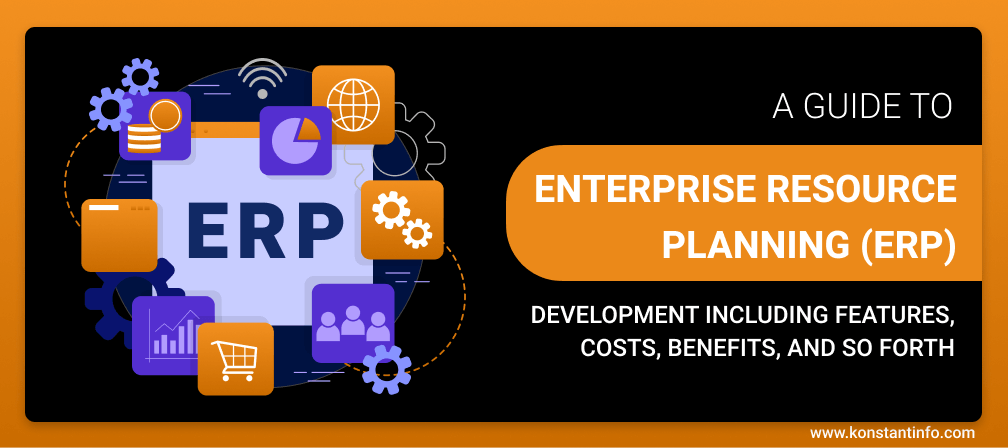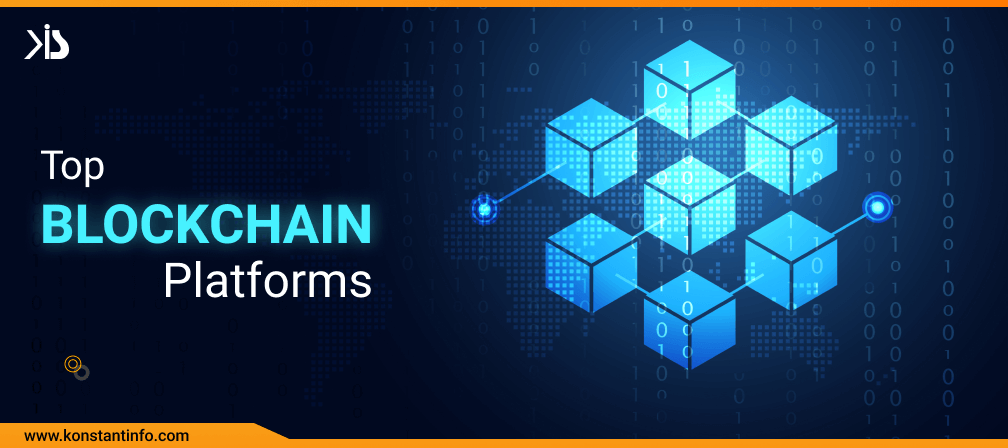
As a business owner, how often do you find it difficult to optimize your business processes across different departments in your organization?
Imagine having a system that serves as the backbone of your business and aids your organization in managing day-to-day business activities more effectively. It does not matter if it is accounting, procurement, risk management, resource management, or supply chain management, ERP systems automate all of these processes without causing any human error.
This blog describes what an ERP system is, who can benefit from ERP, the practices for successfully implementing an ERP system, along with the costs associated with developing an ERP system.
First, let’s discuss what the ERP system is.
Table of Contents
Generally speaking, Enterprise Resource Planning (ERP) can be defined as software that gives your business an integrated platform from which to manage all parts of the business.
Essentially, the ERP system acts as the adhesive that joins together the different computer systems. Even in the absence of ERP, each department would have its own computer to perform its specific tasks. However, with an ERP system, all of these computers can be networked together and accessed through one centralized interface.
Through the adaptation of the ERP system, the various components of the business can interact more easily and the business can be optimized for tangible outcomes.
ERP modules are designed to fit specific business processes to the greatest extent. Offering all the organizational data in one place and supporting processes that help employees perform their tasks effectively.
ERP systems usually consist of a number of components that are connected to a single database and ensure that accurate data is available from a single source throughout the organization.
An overview of some of the most common modules offered by ERP is shown below.
With the help of ERP sales and marketing modules, businesses can store essential sales information such as customer inquiries, quotations, orders, or sales invoices.
Additionally, the module tracks statistics concerning your email campaigns, client engagement, and search engine optimization campaigns so that you can assess the success of your marketing campaigns. This will allow businesses to invest in marketing campaigns that will yield profit.
A materials management ERP module can assist an organization with a multitude of tasks, including identifying the supply chain sources, comparing quotes, evaluating quote quality, creating purchase orders, tracking purchased materials, and verifying invoices when materials are received
Customer Relationship Management is one of the most popular ERP modules in the world. CRM ERP modules are designed to increase sales performance by providing highly effective customer support services.
The CRM system adds greatly to the productivity of the organization and gives these team members the ability to develop a stronger bond with the clients by offering them personalized attention.
Accounting and finance modules in ERP systems provide businesses with access to the organization’s current financial situation and potential future prospects. The finance and accounting module contains the general ledger, accounts payable, accounts receivable, and tax management functions.
Moreover, ERP modules help automate a wide range of business processes, including billing tasks, account reconciliations, vendor payments, and more. In addition to analyzing the financial data, this module can be used to estimate the profit and loss that an organization will experience during a given period.
The key to any organization’s success is its employees. An ERP module like human resources helps organizations keep an accurate record of their employees, ensuring the right person is placed at the right job.
HR management ERP modules can handle everything from generating salary slips to managing payrolls, disbursements, and so forth.
ERP modules for supply chain management are designed to help organizations manage all phases of the supply chain, from the manufacturer to the retailer to the consumer.
By maintaining enough inventory stock, the organizations ensure they never fail to satisfy their customers’ needs. ERP modules like these automate all activities involved in the supply chain, from the transportation of raw materials to the disbursement of finished goods.
As previously mentioned, there are several types of ERP modules, but they all serve the same purpose of reducing the need for human intervention in a variety of business functions.
In this article, we have outlined a few of the benefits that an ERP system can provide to your business.
An enterprise resource planning system allows businesses to automate many aspects of their operation, from customer queries to the generation of final invoices. Thus, employees’ time is freed up for other business operations, resulting in improved productivity.
With the ERP system, all business operations can also be managed from one central portal, increasing overall efficiency.
Implementing an ERP system is a great decision for your business since it will increase efficiency while reducing overhead costs and increasing profitability.
ERP systems provide a single point of access to all of the organizational information, preventing disruptions and delays caused by inaccurate information.
In the past few months, the arrival of the Covid-19 has changed the way businesses operate completely. Organizations and employees alike are now adopting a remote work culture. The problem with remote working is being able to connect all the employees and let them exchange information efficiently and effectively.
This is where enterprise resource management comes into play.
An ERP system connects all employees and allows them to share information efficiently and accurately. Flexibility is another important feature of ERP solutions. As a business grows, these solutions can be tailored to fit the changing workforce.
Regardless of the size of the business, security is a primary concern. In the event that an ERP solution is implemented, it can alleviate security concerns to the maximum extent possible in the organization.
The majority of ERP systems come with built-in security features such as event monitoring, authentication, encryption, and so forth.
For any business to succeed, satisfied customers are just as important as satisfied employees. ERP collects a lot of information about the customers and makes it available for the employees of the company. They can evaluate this information to establish a personalized relationship with the customers.
Therefore, if you decide to develop an enterprise resource planning (ERP) solution, this is what you need to know.
Why do I need an ERP system? Which benefits can be expected from ERP development? What part of your business do you want to automate using ERP?
You should be able to answer these questions before moving forward with your idea of enterprise resource planning development.
You cannot expect developers to be able to work on your project without an understanding of your requirements.
Even if you don’t know the answers, don’t worry. With the help of a reliable offshore ERP development company, clients can draw the requirements for their ERP software along with a rough estimate of the cost of providing ERP solutions.
In any development project, UI/UX design plays an important role. When it comes to the UI/UX design of an ERP system, it should be user-friendly and straightforward.
Start with creating a wireframe of your ERP software. The Wireframe diagram illustrates how each feature of the app will function before the actual development gets underway. You can discuss the prototype with the team of business analysts to decide what should be added and what should be left out.
Your choice of tech stack could be the difference between success and failure. To create a robust ERP solution, you need to use powerful technologies.
Choosing the right tech stack for your ERP solution is largely determined by your needs.
For the purpose of front-end development, ERP developers can rely upon technologies such as Bootstrap, JavaScript, AngularJS, ReactJS, and VueJS.
On the other hand, backend development can be powered by technologies such as NodeJS, Java, .Net framework, Python, and so forth.
Depending on what is needed from the database, you can choose either MySQL, Oracle, or MongoDB.
The technologies listed here are just a few of those that can be used in custom ERP software development. You can have a discussion with your ERP developers to make the selection of the technologies that will work best for your project.
The ERP software development process is now underway. Monitoring the developments of the ERP solutions would be beneficial to you in order to make sure that everything goes smoothly.
Maintain regular contact with the ERP developers and ask them to provide you with feedback on the development of the system. In the event of any difficulties, notify the developers and make sure they are resolved as quickly as possible.
The importance of testing your project cannot be overstated. It is imperative that you hire a team of experienced quality analysts who will test your ERP solutions based on different parameters to see how well they perform under different conditions.
Therefore, we suggest you choose an ERP development company that alongside the ERP software development provides you testing services as well.
Having established the development of a bug-free ERP solution, the next step is to deploy the software and let your employees utilize it. Make sure that your employees share their impressions with the ERP system, this will help you determine the credibility of the ERP in your business case.
The following are some of the most important features you should look for when developing an ERP system to maximize your organization’s productivity and efficiency.
ERP development is centered around enterprise-wide integration. It allows for high levels of synchronization across multiple departments.
For example, each time an order is received, a credit check is automatically initiated, the product’s availability is confirmed, and the distribution schedule is updated. Upon shipping, the customer’s invoice will be generated and sent.
The integration of ERP solutions enables routine business operations to run more efficiently and smoothly since all business operations can be managed within one integrated app.
It is a must-have feature of any enterprise resource planning application because it lays the foundation for basic performance. In the system, information is entered into a common database that can be accessed by different parts of the organization, thus making it possible for various people to work on the data at the same time.
As a crucial feature of enterprise resource planning systems, scalability should also be taken into account. Since your business tends to grow with time, your system should be robust enough to handle future trends easily.
Across the different units of an organization, ERPs should be uniform in appearance and feel. You can also reduce the ERP system design cost with this approach as there is only a small number of reusable templates to create for the different units within the organization.
This is the section where we will discuss the cost of ERP development. Before discussing cost, we should first consider a variety of factors that play an important role in determining cost.
The ERP engineers will analyze your existing business use case to help you finalize your requirement for the ERP system alongside the list of features that should be integrated with your ERP solutions. Depending on this the cost of ERP development will vary. In general, the more complex a project, the greater the cost.
There are always challenges in adapting the employees to the new changes in the business environment. Hence, it is imperative to provide the employees with comprehensive training programs soon after the implementation of the ERP to smoothen their adaptation to the new technology. Training will also add a significant amount of cost.
Through the implementation of an ERP system, the routine activities of an organization can be automated. But still, this automation must conform to the company’s specific standards. That’s why you need to make fine-tunings with your ERP system based on the internal processes of your company to ensure your business gets the optimal results.
No matter where you choose to host your ERP system, such as the cloud or on local hardware, maintenance is a constant requirement. Therefore, ignoring the costs of maintenance is not a very wise choice.
Almost every organization works hard to ensure its business keeps growing. In the light of growth, the organization’s workflow changes. As a result of the workflow changes, your ERP system will also need to be upgraded, adding further expense to your business.
Generally, the cost of the ERP solution development is subject to the aforementioned variables. Hence it would be in your interest to have a discussion with your development company to know your estimated cost.
Enterprise resource planning (ERP) can be beneficial to businesses on a number of levels. Business processes will be greatly automated, resulting in a more efficient and productive work environment for the entire organization.
Have trouble starting your ERP development process? You may not know where to begin. Nevertheless, in that case, you would need to contact the business analyst from our company and make them aware of your business requirements. Their team will thoroughly listen to your requirements and provide you with a solution aligned with your business. Let’s connect with our team now!
On the basis of the implementation, three different types of ERP exist as mentioned below.
2. What Type Of ERP Is The Best Fit For My Business?
Every type of ERP system comes with its own perks and cons. When your business is likely to grow in the future, you might want to look into cloud-based ERP solutions since they can be scaled easily. The best way to determine which ERP will be the right choice for your business is to speak with a sales representative.
The resources of an ERP development company enable them to build off-the-shelf ERP solutions from scratch in the quickest time frame possible. A company has access to all the talent including designers, developers, testers, and projects who are responsible for driving your business towards automation.



Manish Jain is the co-founder and Managing Director at Konstant Infosolutions. He is responsible for the overall operations of the company and has played a major role in bringing Konstant up from its humble beginnings and, with his immense energy and drive, transforming it into a globally trusted name in IT solutions.
Or send us an email at: [email protected]